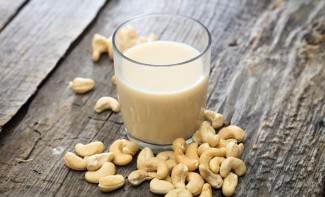
Gone are the days of the only non-dairy milk options being soy or rice milk. More and more people are drinking non-dairy milk because of personal preferences and allergies and intolerances to cow’s milk. Fortunately the amount of options has increased significantly but it may leave you feeling overwhelmed when trying to choose. Here are a few tips to help you navigate the non-dairy aisle.
Non-dairy milk is typically made from blending water with nuts, seeds or grains depending on the base of the milk. Typically emulsifiers and vitamins and minerals are added to the non-dairy milk to make the taste and nutrient profile similar to cow’s milk. You will also see many flavors, such as vanilla, and sweeteners added to non-dairy milk.
- Compare brands and pick the non-dairy milk that has the fewest ingredients. Because non-dairy milk can be a thinner consistency than cow’s milk, companies often add emulsifiers, thickeners and/or oils to help make the milk taste and feel more comparable to cow’s milk.
- Look for brands with no added sugar--the container will often say “unsweetened”. You can also look at the Nutrition Facts Label to confirm that it has 0 grams of added sugar. Many varieties that are sweetened have around 3-4 teaspoons of sugar per 8 oz serving. Decreasing the amount of added sugar that you consume is a great step toward decreasing your risk of chronic disease.
- The protein and calorie content of non-dairy milk varies greatly by the type. For example, soymilk and pea protein milk both contain around 8 grams of protein per 8 oz serving which is similar to the protein in cow’s milk. On the flip side, nut milks (almond, cashew, macadamia), rice milk and coconut milk are much lower in protein, typically 0-2 grams of protein per 8 ounce serving. If you use non-dairy milk to help increase your daily protein intake then you may want to look for options that are higher in protein.
- The calorie content of non-dairy milk can greatly differ as well. Unsweetened plain nut milks like almond and cashew generally have between 40-70 calories per cup while soymilk, rice milk and oat milk have on average between 110- 130 calories per cup. Find the option that best fits your calorie needs and lifestyle.
- Much like protein, if you are using non-dairy milk to increase your daily intake of vitamin D and calcium then look for options that are fortified with calcium and vitamin D.
Another factor to consider is what you use the non-dairy milk for. Different options work better in certain recipes. Soymilk works well for baking, cashew milk for cream sauces, and whatever type you enjoy the taste of for drinking, cereal, smoothies and adding to your coffee. Pick an option that you find delicious and can see yourself using. It doesn’t do any good if you buy a non-dairy milk you don’t like and won’t drink.
If you want to avoid all of the extra ingredients that are often found in non-dairy milk, making your own is a pretty easy process. The most time consuming part of these recipes is soaking whatever you choose as the base. Soak your oats, nuts or rice at night while you are sleeping so it is ready to process in the morning. Check out the Down to Earth recipes section found at https://www.downtoearth.org/recipes and give homemade non-dairy milk a try!
Navigating the non-dairy milk aisle doesn’t have to be an overwhelming experience. Look for options with limited ingredients, no added sugar and the calorie and protein profile that works for your nutrition goals. Have fun trying all the new options available and find a non-dairy milk that you enjoy and fits your needs!